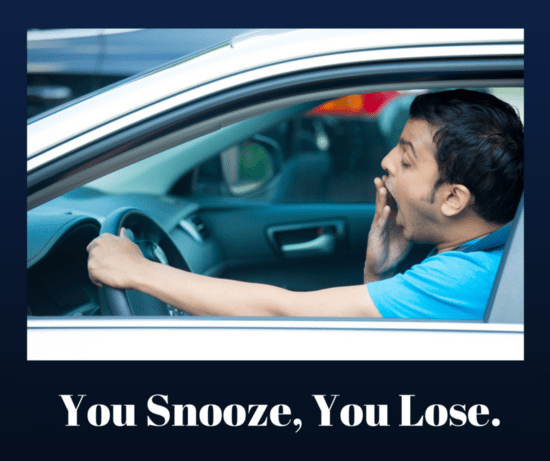
Most of us realize how dangerous driving under the influence or texting, while driving is, but driving while drowsy, can be equally dangerous. Sleepiness can cause slower reaction times, blurred vision, lapses in judgment, and delays in processing information.
Before launching into your vacation, please consider the potential impact of driving while exhausted on your own safety, your family, and other drivers sharing the road with you.
Microsleep While Driving Has Become a National Health Problem:
With over 1,550 fatalities and 76,000 nonfatal injuries occurring annually in the United States alone as a result of drowsy driving, sleep loss has become a public health problem.
When experiencing microsleeps while driving an automobile, from the perspective of the driver, he or she drives a car, and then suddenly realizes that several seconds have passed by unnoticed. It is not obvious to the driver that he or she was asleep during those missing seconds, although this is in fact what happened. The sleeping driver is at very high risk for having an accident during a microsleep episode.
Fast Facts About Driving While Fatigued:
- 100,000 crashes each year are caused by fatigued drivers
- 55% of drowsy driving crashes are caused by drivers less than 25 years old
- Being awake for 18 hours is equal to a blood alcohol concentration (BAC) of 0.08%, which is legally drunk and leaves you at equal risk for a crash
- In 2010, the AAA Foundation for Traffic Safety released a study that shows that fatigue is a factor in one in six deadly crashes; one in eight crashes resulting in hospitalization, and one in fourteen crashes in which a vehicle was towed.
- The National Highway Traffic Safety Administration (NHTSA) estimates that drowsy driving results in 1,550 deaths, 76,000 injuries, and more than 100,000 accidents every year.
Tips for not becoming a Drowsy Driver Accident Statistic:
- Get a good night’s sleep (seven to nine hours) before you begin your trip.
- Plan breaks into your driving schedule; don’t be so rushed to arrive at your destination that you can’t stop for rest.
- Stop every 100 miles or two hours for a walk, run, snack, or drink.
- Bring a buddy who can share the driving.
- If you think you could fall asleep, pull over and take a 15-20 minute nap.
- Avoid driving at times you would normally be asleep.
- Avoid alcohol and medicines that cause drowsiness.
- Caffeine can increase alertness for several hours, but you will still need adequate rest if you want to prevent fatigue-related errors.
Warning Signs That it is Time to Pull Over:
- Difficulty focusing, frequent blinking, heavy eyelids.
- Trouble keeping your head up.
- Drifting onto rumble strips, swerving in your lane.
- Inability to clearly remember the last few miles driven.
- Missed exits or traffic signs.
- Repeated yawning.
- Feeling restless or irritable.
Specific At-Risk Groups for Drowsy Driving
- Young people, especially males under age 26
- Shift workers and people with long work hours; working the night shift increases your risk by nearly 6 times; rotating-shift workers and people working more than 60 hours a week need to be particularly careful
- Commercial drivers-especially long-haul drivers – at least 15% of all heavy truck crashes involve fatigue
- People with undiagnosed or untreated disorders: people with untreated obstructive sleep apnea have been shown to have up to a seven times increased risk of falling asleep at the wheel
- Business travelers who spend many hours driving or may be jet lagged
Call our office today for free books for WV accident victims: Collision Care: West Virginia Auto Collision Guide, and Righting the Wrong, West Virginia Serious Injury Guide.
304-594-1800
Jeffery Robinette was admitted to practice law in 1991 and is licensed in all levels of state and federal trial courts in West Virginia. Mr. Robinette is also licensed in all state and federal appeals courts in West Virginia and the United States Supreme Court. As a National Board Certified Trial Attorney who has handled hundreds of motor vehicle, injury, and construction defect claims and a leading author on insurance claims settlement issues and difficulties in West Virginia, Jeff Robinette is uniquely qualified to represent your best interest.




